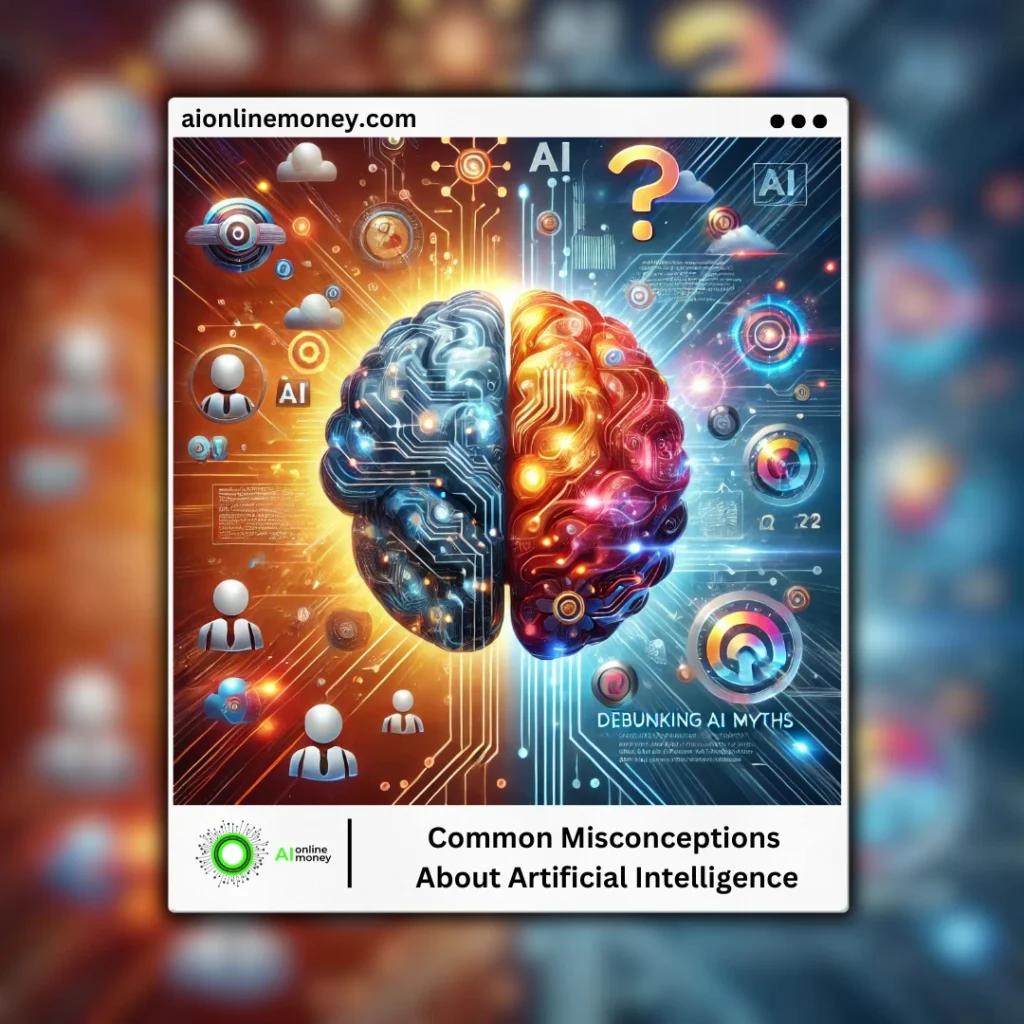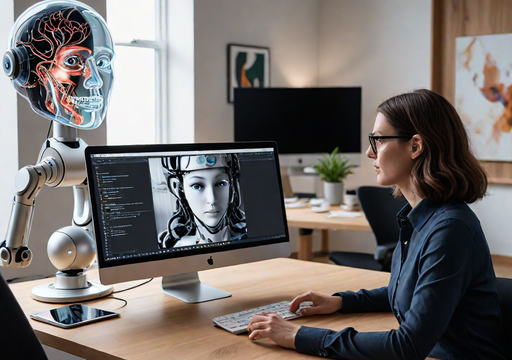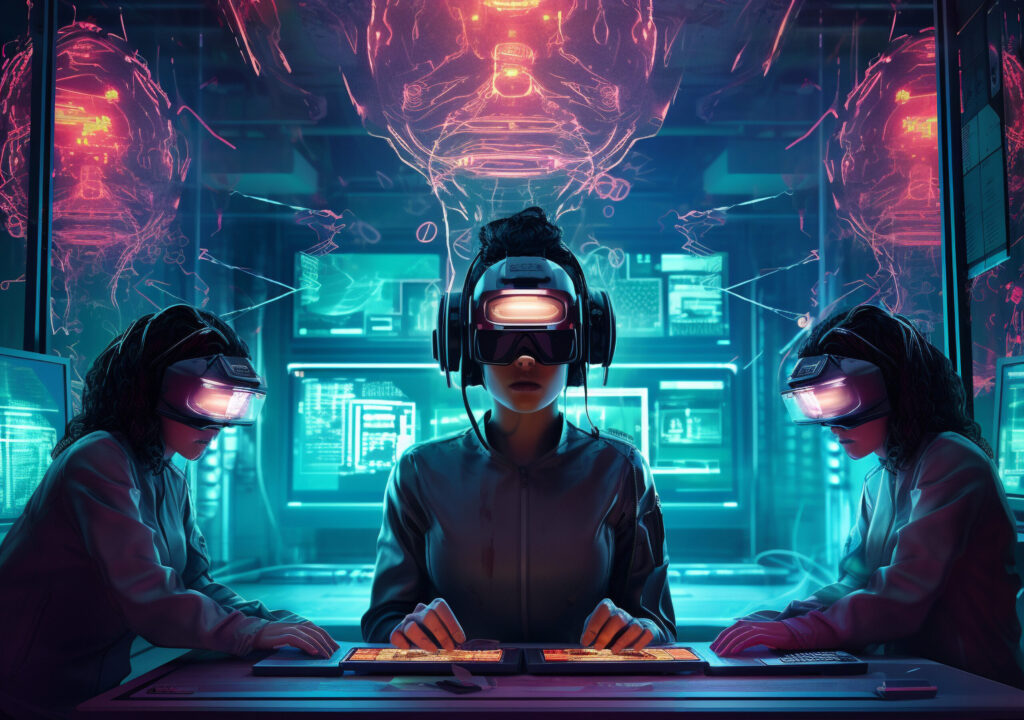Table of Contents
In today’s era, it is very important to be informed about AI. advancement and upgradation of information in our minds are crucial to getting complete knowledge about AI. Artificial Intelligence (AI) is often seen as a god who knows everything Or a superhero / a supervillain. Some people may think AI will solve our problems and opposite of this some people may also think that AI will create many new and dangerous problems.
So let’s clear up some important and common misconceptions about Artificial Intelligence technologies. We’ll discuss the myths related to ai surrounding it and explain what AI can and cannot do.
The Rise of Misconceptions about AI
1. In the Future AI Will Steal All Our Jobs
Imagine an AI robot is sitting on a corporate office chair with corporate dressing like a handsome hulk who steals your job, the hearts of all office girls with a cup of coffee and you are watching him from outside the office window. But wait just imagine it because it won’t happen.
“AI Will Steal All Our Jobs “ is one of the most common misconceptions about artificial intelligence is that it’s here to rob us of our livelihoods. While AI can automate different repetitive tasks and help many of us. Therefore it creates new opportunities. Now just imagine Ai as your friend or colleague who helps you in your job such as taking all the boring stuff or work which are not creative or which can be repeated tasks so you can focus on creative projects
2. AI Has Feelings
Let’s talk about this: AI doesn’t cry when you shout at Siri, nor does it feel sad like a human after wasting his feeling emotions on his ex. This is one of the most persistent misconceptions about artificial intelligence, probably because movies make robots seem emotional.
Like in movies, they can also show robots kissing each other or simply one robot falls in love with a human girl. Spoiler alert: Your vacuum cleaner doesn’t love you.
3. AI Knows Everything
There are different common misconceptions about artificial intelligence People often believe AI is omniscient (well-known), but it’s not. It’s incredibly good at specific tasks but clueless outside its training. If you ask AI to summarize Shakespeare, it might excel. Ask it to explain your girlfriend’s mind or how long your relationship will last. It will lag so This is also a common misconceptions about artificial intelligence.
4. AI Will Dominate the World
Now some people may imagine that an AI robot may become prime minister and bring rules for example. marriage will be banned. Is AI dangerous for the future? Not really. While some people worry about robots taking over, AI today is not smart enough to do that. It’s just here to help you with things like recommending TV shows or making tasks easier. So, no need to worry—your toaster isn’t plotting anything! It’s just a common misconceptions about artificial intelligence.
5. AI is Magic
You type a prompt on AI such as Make me a millionaire and then the AI will say Abra ka dabra etc and guess what you are now a millionaire, now stop imagining! It’s nothing just Another common misconceptions about artificial intelligence is that it’s some kind of sorcery. The reality? AI is powered by data, algorithms, and a lot of coding—no wands involved.
Different Myths Related to AI
1. AI Can Think Like Humans
A common misconceptions about artificial intelligence or myth related to AI is that it thinks like humans. Now lot of people may think AI can also feel emotions, like love and sadness. But in reality, AI is as emotionless as rocks or snakes (not yours).
If AI had feelings, it’d probably be the friend who never gets excited about pizza—like, who doesn’t love pizza, right? If AI had feelings, it’d probably be the friend who never gets excited about pizza—like, who doesn’t love pizza, right? Some folks believe AI can make all decisions on its own. Well, AI might be good with numbers, but when it comes to choosing pizza toppings, it’s just as confused as we are. It still needs a little help!
2. AI is Always Right
The second common misconceptions about artificial intelligence or myth related to AI is that Many people think AI is always right, but it’s not. AI can make mistakes, especially if it’s fed bad data. Ever get a product recommendation and think, “Why would I ever need this?” It’s like your ex-girlfriend suggesting you get back together—AI can get things wrong too!
3. AI is Too Expensive
Sure, some AI systems cost a fortune, but many tools are affordable. These common misconceptions about artificial intelligence or myths related to AI prevent small businesses from exploring AI benefits, even when tools like chatbots can save them time and money. Remember, AI is a productivity tool, not like your friends who borrow money and then forget to pay you back. AI helps you get things done efficiently, without leaving you hanging for what you pay!
Is AI Dangerous for the Future?
1. Ethical Concerns
Imagine your driving you’re bike at a slow speed with a helmet it’s very nice and safe to ride but if you are riding your bike at 200+ speed without any helmet it’s not safe it is very dangerous. It’s completely on you how you ride your bike, like this The question “Is AI dangerous for the future? depend on how a person is driving or using AI. often stems from ethical worries. Bias in AI models and misuse of data are legitimate concerns, but these issues can be addressed through responsible development and regulation.
2. Job Automation
Yes, AI automates jobs, but it also creates new roles—from AI trainers to data analysts. It’s not stealing jobs; it’s reshuffling them. Think of it as job evolution, not extinction.
3. Weaponization of AI
A valid concern when asking “Is AI dangerous for the future?” is its potential misuse in weapons. This is why governments and organizations need strict regulations to ensure AI serves humanity, not harms it.
What AI Can and Cannot Do
Understanding what AI can and cannot do helps separate reality from fiction. Here’s a quick rundown:
- What AI Can Do:
- Analyze massive datasets in seconds.
- Automate mundane tasks like sorting emails.
- Assist in creative processes by generating ideas or drafts.
- What AI Cannot Do:
- Feel emotions or form relationships (sorry, sci-fi fans).
- Understand context the way humans do.
- Replace human intuition and creativity completely.
Examples of AI Myths
1. AI is Sentient
This is one of the most laughable examples of AI myths. People often think AI has awareness. If AI were sentient, it would probably just ask for a break from all the data processing.
2. AI Can Replace Artists
Another example of AI myths is the fear that it will wipe out creativity. While AI can assist in generating content, true artistry remains a human domain. AI might paint a picture, but it’ll never capture the soul.
These are some myths related to AI or common misconceptions about artificial intelligence
Why Busting Misconceptions Matters
In today’s world, everyone uses AI for different tasks and information collection purposes so it becomes necessary to understand Common misconceptions about artificial intelligence lead to unnecessary fears and unrealistic expectations. By addressing myths related to AI, we can approach its capabilities with clarity and optimism. AI isn’t a monster under the bed; it’s a tool we can harness responsibly.
Conclusion
Artificial intelligence is a game-changer, but it’s not the dystopian nightmare some make it out to be. By debunking common misconceptions about artificial intelligence, clarifying myths related to AI, and understanding what AI can and cannot do, we can embrace its potential without fear. So, next time someone asks, “Is AI dangerous for the future?” just smile and say, “Only if it starts making dad jokes!”



